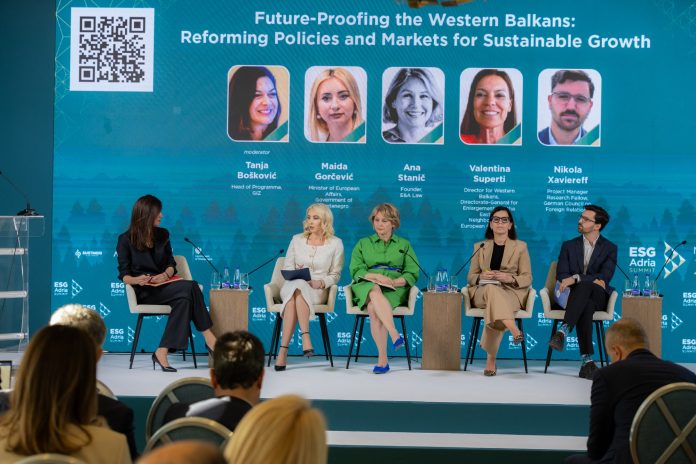Reforms and regional cooperation have the potential to become the driving force of sustainable economic growth and deeper integration of the Western Balkans into the EU Single Market. Experts and decision-makers agree that the Growth Plan is a strategic opportunity the region must seize—boldly and decisively—through modernization, enhanced legal certainty, and attraction of responsible investments. These were key takeaways from the panel “A Sustainable Future for the Western Balkans: Policy and Market Reforms for Long-Term Growth”, held during this year’s ESG Adria Summit in Tivat. The panel was organized by the GIZ RegioTrade program, funded by the German Federal Ministry for Economic Cooperation and Development, in cooperation with Montenegro’s Ministry of European Affairs.
The panel brought together high-level institutional representatives, international organizations, and experts in European integration and sustainable development, aiming to jointly address the challenges and opportunities for accelerated and sustainable economic growth of the region in the context of EU integration.
Maida Gorčević, Minister of European Affairs of Montenegro, emphasized that the Growth Plan is a key instrument for accelerating reforms and Montenegro’s integration into the EU Single Market.
“Our focus is on modernizing infrastructure, digital transformation, and strengthening the rule of law—all to make Montenegro a competitive, sustainable economy and a reliable EU partner. Through the Growth Plan, we are not just aligning with EU standards; we are laying the foundation for long-term economic development and stronger regional cooperation,” said Gorčević.
She also stressed that effective use of external financial support is only possible with strong institutions, transparency, and clear, measurable outcomes:
“Our goal is not short-term aid, but permanent, structural changes that will bring benefits to future generations.”
Valentina Superti, Director for the Western Balkans and Eastern Neighborhood at the European Commission’s DG NEAR, noted that the Growth Plan is a concrete expression of the EU’s commitment to accelerating the region’s integration through reforms that bring tangible benefits to citizens.
“The focus is on deeper involvement in the EU Single Market—with clearly defined criteria and real support. For success, it is crucial that countries in the region see this opportunity as a catalyst for reforms in the areas of rule of law, digital and green transition, and strengthening the business environment. The European Commission remains a partner to the region—not only as a donor, but as an ally in building a more resilient, competitive, and integrated economic space.”
Dr. Tanja Bošković, Program Manager at GIZ, stressed that the Western Balkans has the capacity and knowledge to respond to the complex challenges of the modern age. However, this requires bold and responsible policies and leveraging the opportunities offered by deeper integration with the EU market and stronger regional connectivity—within the framework of the Growth Plan.
“This panel provided a valuable opportunity to openly discuss how reform processes can be transformed into concrete mechanisms that support sustainable development, enhance legal certainty, and open space for serious investments. The development of the region is not just a matter of European integration—it is a process of building a transparent, resilient, and competitive economic area that delivers real benefits to all citizens.”
Ana Stanič, founder of E&A Law, London, explained the importance of effective dispute resolution mechanisms for ensuring economic growth and prosperity in the region.
“While commercial arbitration is a key tool for resolving cross-border disputes, it is underutilized in the region. Investment agreements signed by Western Balkan countries with EU member states and beyond can play a vital role in boosting investor confidence by providing arbitration as a dispute resolution mechanism between foreign investors and host states. These agreements are part of the regulatory framework for investment, centered on legal certainty and rule of law.”
Nikola Ksavieref, researcher and project manager at the German Council on Foreign Relations (DGAP), noted that no single country is large enough to have significant influence alone, making regional cooperation and policy alignment essential for maximizing the potential of the 18-million-person market in attracting major investments.
He added that think tanks can support EU enlargement and the implementation of the Growth Plan by communicating the mutual benefits of the process and creating dialogue between the EU, its member states, and candidate countries:
“Ultimately, we must harness the potential of the EU Growth Plan, which contains both transactional and value-based elements—making it a rare example of a value-driven transactional framework.”
Today’s discussion offered concrete insights into how the Western Balkans Growth Plan can be strategically utilized to accelerate reforms, strengthen regional cooperation, improve the business environment, and fully integrate into the EU Single Market. Special emphasis was placed on reforms that attract sustainable investment and enhance legal certainty through improved dispute resolution mechanisms. Panelists underscored the importance of a regional approach, interconnected markets, and credible policies to build a more stable, competitive, and EU-ready region.


